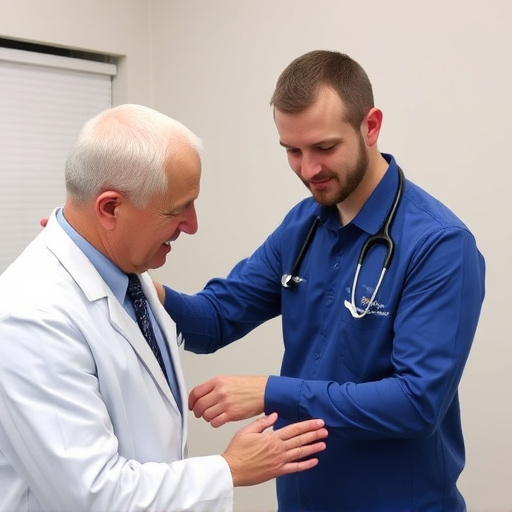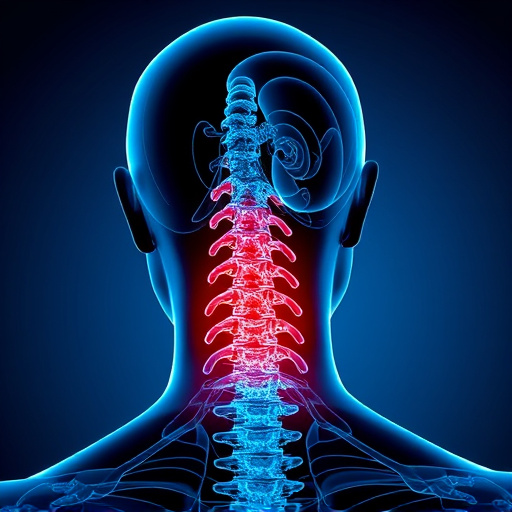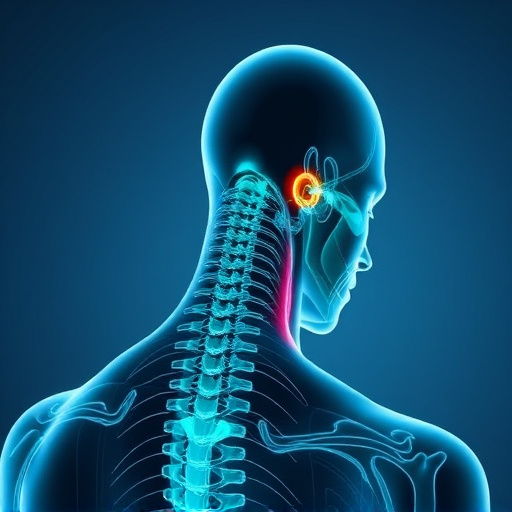Athletic musculoskeletal injuries, including whiplash common in contact sports, significantly impact athletes' performance and well-being. Rehabilitation programs, emphasizing a holistic approach integrating physiotherapy, exercise physiology, and mental health support, aid in regaining functionality and enhancing resilience. Whiplash treatment specialists employ advanced techniques like manual therapy, targeted exercises, and technology for short-term pain relief and long-term functional restoration. Personalized rehabilitation plans consider individual factors to prevent future occurrences. Advanced therapies speed up recovery times and improve athletic performance. Preventative measures, education, and regular check-ups with healthcare professionals minimize injury risk for active individuals. Whiplash treatment specialists play a crucial role in facilitating safer returns to sport and fitness routines.
Rehabilitation is a cornerstone in the journey of athletes and fitness enthusiasts toward optimal performance and recovery. This comprehensive guide explores various aspects of athletic rehabilitation, from understanding common injuries like whiplash to advanced therapies designed to accelerate healing. We delve into customized programs tailored to individual needs and preventative measures ensuring long-term well-being for active individuals, with a focus on expert strategies in whiplash treatment.
- Understanding Athletic Injuries and Their Impact on Performance
- The Role of Rehabilitation in Accelerating Recovery for Athletes
- Whiplash Treatment: A Specialist's Approach to Common Sports-Related Neck Injuries
- Customized Rehabilitation Programs for Optimal Fitness Restoration
- Incorporating Advanced Therapies for Enhanced Athlete Recovery
- Preventative Measures and Long-Term Well-being for Active Individuals
Understanding Athletic Injuries and Their Impact on Performance

Athletic injuries, especially those affecting the musculoskeletal system, can significantly impact an athlete’s performance and overall well-being. These injuries range from sprains and strains to more severe conditions like ligament tears or muscle ruptures. Understanding the nature and extent of these injuries is crucial for effective rehabilitation. Whiplash treatment, a common issue among athletes, particularly in contact sports, involves specialized care to address neck and spinal injuries resulting from sudden impacts.
Rehabilitation programs are tailored to address not just the physical symptoms but also the psychological effects of injury. Athletes often face challenges in adapting to reduced mobility or strength, which can lead to decreased confidence and performance anxiety. A comprehensive approach involving physiotherapy, exercise physiology, and mental health support ensures athletes receive holistic care. This helps them regain functionality, rebuild strength, and ultimately return to their sport with enhanced resilience and a lower risk of future injuries.
The Role of Rehabilitation in Accelerating Recovery for Athletes

Rehabilitation plays a pivotal role in accelerating recovery for athletes, offering a structured and tailored approach to restore physical function after injury or surgery. This comprehensive process involves various therapeutic techniques designed to reduce pain, improve mobility, and strengthen muscles. By focusing on individual needs, rehabilitation programs can significantly shorten recovery timelines, enabling athletes to return to their sport sooner.
Whiplash treatment specialists often integrate advanced methods such as manual therapy, exercise prescription, and technology-assisted rehabilitation into these programs. These strategies not only target the affected areas but also address underlying issues that could contribute to ongoing discomfort or re-injury. Ultimately, effective rehabilitation empowers athletes with the tools necessary for long-term health and optimal performance on the field.
Whiplash Treatment: A Specialist's Approach to Common Sports-Related Neck Injuries

Whiplash, a common injury among athletes and fitness enthusiasts, particularly those involved in contact sports or high-impact activities, requires specialized care for effective recovery. This often involves advanced whiplash treatment techniques tailored by experts to address the specific needs of active individuals. A whiplash treatment specialist plays a pivotal role in managing this condition, focusing on both short-term pain relief and long-term functional restoration.
Specialists employ a multi-faceted approach that may include manual therapy, targeted exercises, and innovative treatments such as ultrasound or electric stimulation to reduce inflammation and promote healing. They also emphasize education about injury prevention and postural awareness, empowering athletes to adopt strategies that minimize the risk of future whiplash incidents. This holistic perspective ensures not only a speedy recovery but also prepares individuals for a safe return to their chosen sport or fitness routine.
Customized Rehabilitation Programs for Optimal Fitness Restoration

Rehabilitation plays a pivotal role in restoring athletes and fitness enthusiasts to their peak condition after an injury or surgical procedure. Customized rehabilitation programs are tailored to address specific needs, ensuring optimal fitness restoration. These programs often incorporate advanced techniques, such as those employed by whiplash treatment specialists, to target underlying muscle imbalances and soft tissue injuries that may contribute to long-term issues.
By combining expertise in biomechanics, exercise science, and manual therapy, rehabilitation specialists create personalized plans that not only address the immediate injury but also focus on preventing future occurrences. This holistic approach involves progressive exercises designed to improve strength, flexibility, endurance, and coordination, all while considering individual factors like age, activity level, and underlying health conditions.
Incorporating Advanced Therapies for Enhanced Athlete Recovery

In the realm of athlete rehabilitation, advanced therapies play a pivotal role in enhancing recovery and performance. For athletes and fitness enthusiasts suffering from injuries like whiplash, specialized treatments can make all the difference. A whiplash treatment specialist is a crucial asset, offering innovative techniques to alleviate pain and accelerate healing. These specialists employ various methods, such as targeted physical therapy, shockwave therapy, and advanced massage techniques, to restore mobility and reduce inflammation.
By integrating these cutting-edge therapies into rehabilitation programs, athletes can experience faster recovery times and improved overall performance. Such treatments not only address the immediate symptoms but also focus on long-term functional restoration. This holistic approach ensures that athletes return to their sports stronger and more resilient, ready to tackle the rigors of competitive training and competition.
Preventative Measures and Long-Term Well-being for Active Individuals

Active individuals, be they athletes or fitness enthusiasts, often face the risk of injuries, especially those involving the musculoskeletal system. Implementing preventative measures is a key strategy in maintaining long-term well-being for these active folks. Regular stretching and strengthening exercises tailored to individual needs can significantly reduce the likelihood of common sports-related injuries. Additionally, proper warm-up routines before workouts and cool-down sessions afterward help prepare muscles and joints for physical demands, minimizing shock and strain.
Whiplash treatment specialists emphasize the importance of education and awareness. Athletes should be taught about the signs and symptoms of overuse injuries and acute traumas, enabling them to seek prompt attention. Regular check-ups with healthcare professionals can identify potential issues early on, allowing for timely interventions. By combining these preventative measures with a holistic approach to wellness, active individuals can enjoy their favorite activities while mitigating risks associated with repeated physical stresses.














